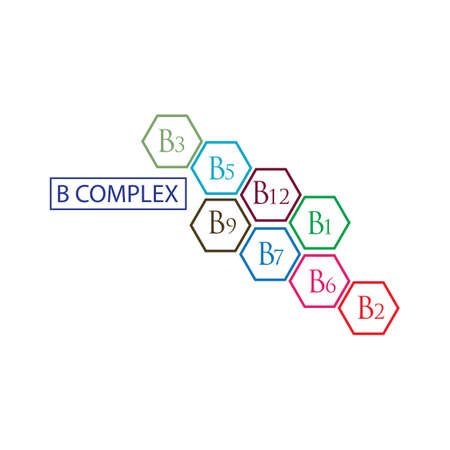Introduction
The vitamins B-complex are well-known examples of water-soluble nutrients that are easily absorbed by a healthy stomach and excreted by the kidney. They are necessary for key physiological activities and play an important role in maintaining healthy health. (1). Vitamin B complex was originally assumed to be a single nutrient found in extracts of rice, liver, and yeast. However, researchers eventually discovered that these extracts included numerous vitamins, which have been assigned unique numbers. Vitamins B’s are a group of water-soluble vitamins that perform vital functions in cell metabolism. Though they have similar names, research demonstrates that these vitamins are chemically separate and frequently coexist in the same foods.
Importance of Vitamin B Complex for Health and Wellness
Vitamin B complex plays a crucial role in maintaining overall health and wellness. Comprising a group of eight water-soluble vitamins, it supports various bodily functions, including metabolism, energy production, nerve function, and cell health. From aiding in the conversion of food into energy to supporting the nervous system, each B vitamin contributes uniquely to our well-being.
Types of Vitamin B complex and their Functions

| Vitamin | Function |
| B1 (Thiamine) | Essential for converting carbohydrates into energy, supporting nerve function, and maintaining heart health. |
| B2 (Riboflavin) | Crucial for energy production, metabolism of fats, proteins, and carbohydrates, and maintaining healthy skin. |
| B3 (Niacin) | Supports energy production, aids in DNA repair, helps maintain healthy skin, and supports nervous system function. |
| B5 (Pantothenic Acid) | Necessary for synthesizing and metabolizing fats, proteins, and carbohydrates, and producing hormones. |
| B6 (Pyridoxine) | Plays a role in amino acid metabolism, neurotransmitter synthesis, and red blood cell formation. |
| B7 (Biotin) | Vital for metabolism of carbohydrates, fats, and amino acids, and supporting healthy hair, skin, and nails. |
| B9 (Folate) | Crucial for DNA synthesis, red blood cell formation, and fetal development during pregnancy. |
| B12 (Cobalamin) | Essential for nerve function, DNA synthesis, red blood cell production, and energy metabolism. |
Signs and Symptoms of Vitamin B Complex Deficiency
Deficiency in vitamin B complex can lead to various health issues, including:
• Fatigue
• Weakness
• Numbness or tingling in extremities
• Anemia
• Poor memory and concentration
• Skin disorders
• Digestive problems
• Depression and mood swings
• Neurological issues
Food Sources of Vitamin B Complex

Including a variety of foods rich in B vitamins in your diet can help prevent deficiency. Some sources include:
• Whole grains (brown rice, quinoa, oats)
• Meat and poultry (chicken, turkey, beef)
• Fish and seafood (salmon, tuna, trout)
• Eggs
• Dairy products (milk, cheese, yogurt)
• Legumes (beans, lentils, chickpeas)
• Leafy green vegetables (spinach, kale, broccoli)
• Nuts and seeds (almonds, sunflower seeds, peanuts)
Benefits of Vitamin B Complex
Vitamin B complex has lately gained attention in the world of beauty, with a number of studies indicating how the use of Vitamin B in face creams can help to fight aging. B-complex vitamins enhance beauty by promoting of healthy hair, skin and nails, by counteracting damage caused by free-radicals molecules that breakdown healthy cells and contribute to ageing and disease. Other benefits of vitamin B complex include:
• Increased energy levels
• Improved metabolism
• Enhanced mood and cognitive function
• Healthy skin, hair, and nails
• Support for nerve function and cardiovascular health
• Prevention of birth defects during pregnancy
Deficiency of vitamin B complex
- Vitamin B1, B2, and B3 deficiencies can lead to undernourished hair follicle cells.
- Vitamin B7 (biotin) is also required to maintain the texture, tone, and strength of our hair, and a lack of it might result in hair loss. If you have persistent skin problems or are tired of having a dull and unhealthy complexion, it might be due to a vitamin B deficiency.
- Inadequate intake of vitamins B9 or folic acid can decrease cell division inside hair follicles, slowing hair growth. A number of B vitamins are important for nail health.
- Vitamin B12 (riboflavin) helps the body to absorb the essential mineral iron, which is necessary for healthy and strong nails. Without enough access to usable iron, the fingernails can turn white, brittle, thin and grow abnormally. Vitamin B12 in addition to nail health also plays an important role in the formation of red blood cells. A deficiency of B12 can lead to the development of anemia. One of the symptoms of anemia is pale, unhealthy or unsightly nails.
According to research, heavy drinkers have an increased requirement for B vitamins, and effective treatment of B-complex vitamin deficiencies may lessen alcohol cravings. According to double-blind studies, taking a vitamin B-complex multivitamin may help lower anxiety, perceived stress, and fatigue.
Daily Recommended Intake of Vitamin B Complex
The recommended daily consumption of B vitamins varies with age, gender, and other variables. Here are the general guidelines:
| Vitamin | Recommended Daily Intake (mg or mcg) |
| B1 | 1.1 – 1.2 mg |
| B2 | 1.1 – 1.3 mg |
| B3 | 14 – 16 mg |
| B5 | 5 mg |
| B6 | 1.3 – 1.7 mg |
| B7 | 30 – 100 mcg |
| B9 | 400 – 800 mcg |
| B12 | 2.4 mcg |
Supplementing with Vitamin B Complex
In some cases, individuals may need to supplement their diet with vitamin B complex, especially if they have dietary restrictions, malabsorption issues, or certain health conditions. However, it’s essential to consult with a healthcare professional before starting any supplements to determine the appropriate dosage and ensure safety.
Precautions and Potential Side Effects
While vitamin B complex supplements are generally safe when taken as directed, excessive intake can lead to adverse effects. Potential side effects may include:
• Nausea
• Vomiting
• Diarrhea
• Allergic reactions
• Risk of toxicity with certain B vitamins (especially B6 and B12)
It’s crucial to follow the recommended dosage and avoid exceeding the tolerable upper intake levels to prevent adverse effects.
Conclusion: Incorporating Vitamin B Complex into Your Health Routine
Vitamin B complex is essential for overall health and well-being, supporting various bodily functions and processes. By consuming a balanced diet rich in B vitamin sources and considering supplementation when necessary, you can ensure adequate intake and promote optimal health. Remember to speak with a healthcare expert for individualized advice and assistance based on your unique circumstances. Incorporating vitamin B complex into your health routine can lead to improved energy levels, enhanced mood, and better overall vitality.
